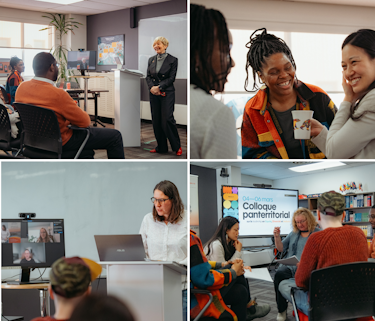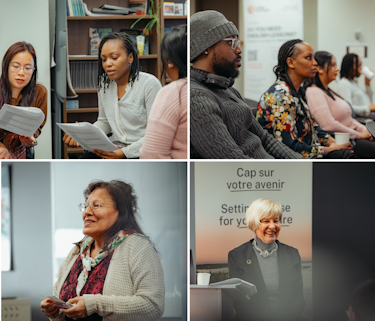Upcoming events
Stay informed about our upcoming activities at the College and in the community.
Free
Our cookies and those of our partners help improve your experience and analyze your use of the website. To learn all about cookies, check our privacy policy

The Pan-Territorial Symposium on Leadership in Equity, Diversity, and Inclusion (EDI) inspired more than fifty professionals from March 4 to 6 across the three Northern territories. This event was conducted in French and successfully brought together leaders, experts, and members of Northern Canada’s Francophone communities, all committed to promoting inclusive leadership adapted to Northern realities.
"When I saw the different topics in the program, such as gender and sex issues, how to be a good ally, and the value of emotional intelligence, I found it fascinating. I could see that thanks to the speakers and the fact that it was a pan-territorial symposium, that it truly addressed the reality of the North, and that I would find strategies and tools to better do my job." (translated from French) — Rosie Benning (she/her), Director of Education and Training at Collège Nordique, participant, and facilitator for Day 3 in the NWT.
The first day, hosted from Nunavut, began with a presentation by Amadou Ghouenzen Mfondi (he/him), Coordinator of Francophone immigration EDI initiatives at the Fédération des communautés francophones et acadienne du Canada (FCFA). Titled “Equity, Diversity, and Inclusion (EDI): Understanding the Concepts to Better Utilize the Tool,” this presentation laid the groundwork for the symposium by exploring the key concepts of equity, diversity, and inclusion. Mr. Mfondi emphasized the importance of an accurate and nuanced understanding of these concepts for their effective application in professional and community settings.
"I didn’t learn what EDI was during the symposium, but it resonated much louder in my mind not to wait for the right moment to take action and not to fear differences. Together, they can become a strength, so we need to share them as much as possible and learn from each other." (translated from French) — Lucas Beaudre (he/him), Project Manager at Collège Nordique, participant.
The day continued with Helen Roos (she/her), consultant and community educator, who led a session titled “Being a good ally to Inuit or Indigenous communities of the lands on which we live.” Ms. Roos highlighted the responsibilities and approaches necessary to actively support Indigenous communities, emphasizing the importance of listening, respect, and genuine collaboration.
"The phrase I remember is not to walk behind or in front, but alongside Indigenous communities. It should be that way every day, in the projects we want to carry out for the revitalization of Indigenous languages." (translated from French) — Mounir Barry (he/him), Director of Student Experience and Quality Assurance at Collège Nordique, participant.
Finally, Stéphane Cloutier (he/him) closed the day with his presentation, “Tunngarniq: How to Encourage and Support Linguistic Diversity.” He addressed the challenges and opportunities related to promoting linguistic diversity in Northern communities, proposing strategies to encourage learning and the use of local languages.
"What I will take away most is truly the idea of living together, developing shared values, and having mutual respect for each other’s culture. We can’t develop something that can just be put in place tomorrow. EDI is a value that must be defended daily through our actions. It’s about integrating it into small, continuous actions." (translated from French) — Marion Perrin (she/her), Coordinator of the Northwest Territories Francophone Immigration Network, participant.
Read the detailed summary of Day 1 here.
The second day, broadcast from the Yukon, kicked off with Paige Galette (she/her), a nationally renowned consultant and community educator, presenting “The Glass Cliff: Leadership Beyond the Ceiling.” She explored the additional barriers faced by people in leadership positions from diverse backgrounds, going beyond the traditional and well-known concept of the glass ceiling, focusing on resilience and empowerment strategies.
"Today, more than ever, I believe it’s the responsibility of those in leadership positions to actively work to become more inclusive, celebrate diversity, and implement more equitable practices. This is an ongoing effort, so I think it’s crucial to continue, on a daily basis, to take concrete steps to develop these skills." (translated from French) — Patrick Arsenault (he/him), Executive Director at Collège Nordique, participant.
Véro Lachance (they/them) then led a session titled “Romanticizing the Great North: A Look at a Colonial Fantasy,” offering a critical perspective on representations of Northern Canada and the associated colonial implications. This presentation encouraged participants to reflect on stereotypes and dominant narratives that shape perceptions of the North.
"I would say that we’ve already made great strides in collaborating with Indigenous communities and organizations here at Collège Nordique, but there will always be work to do. [...] Ultimately, if we are to work for and with Indigenous communities, we need to integrate it more. One way could be by inviting more Indigenous speakers next year." (translated from French) — Rosie Benning (she/her), Director of Training and Education at Collège Nordique, participant and moderator of the 3rd day in the Northwest Territories
The day concluded with François Bernier (he/him) and his presentation, “When the Impossible Becomes Possible: Inclusive Leadership and Resilience in Service of Francophonie.” He shared inspiring examples of inclusive leadership and resilience, demonstrating how these qualities can strengthen Francophone communities in challenging contexts.
"As someone with a disability, François' testimony resonated deeply with me. It sparked all kinds of emotions. His words and ideas gave me courage, and I am convinced that this session was an eye-opener for many. A step toward a more accessible and compassionate professional world!" (translated from french) — Marilou Pilote (she/her), Marketing and Content Creation Coordinator at Collège Nordique, participant
Read the detailed summary of Day 2 here.
The final day, hosted from the Northwest Territories, began with Bianca Briciu (she/her) and Michaël Séguin (he/him), who co-led the session “Developing Inclusive Leadership: The Challenge of linking Personal, Relational, and Organizational Dimensions.” These two experts highlighted the importance of emotional intelligence and self-awareness in developing inclusive leadership, offering strategies for transforming obstacles into opportunities for collective growth.
"I wanted to learn more about EDI. We encounter it every day without fully understanding how it presents itself, and we lack education on it. We all need to be leaders in EDI, and a leader isn’t necessarily someone with a high-ranking position. It’s about how you manage your personal and professional life." (translated from French) — Yakshini Bootoo (she/her), Administrative Assistant to the Executive Director at Collège Nordique, participant.
This was followed by a panel discussion moderated by Sandie Redon (she/her), featuring Rose-Eva Forgues-Jenkins (she/her), Charli-Rose Pelletier (she/her), Selena Mell (she/her), and Dr. Ghizlane Laghzaoui (she/her), titled “Leadership and Gender: Deconstructing Stereotypes to Support Diversity and Inclusion.” Discussions focused on the challenges associated with gender stereotypes and ways to foster a more inclusive organizational culture with EDIA+.
"The main idea, in my opinion, is that leadership should be gender neutral. We know very well that today there are still stereotypes that persist, and these lead to conflict and unequal access to leadership positions. [...] It was therefore an opportunity for me to deconstruct these stereotypes so that we can become aware of the ones we have and work on them individually and collectively for a better life together with EDIA+." — Sandie Redon (she/her), Coordinator of Women and Gender Equality at the Fédération franco-ténoise, speaker and participant.
The symposium ended with a coaching session led by Denise Amyot (she/her), entitled “Engaging people's hearts and minds in their know-how and interpersonal skills to develop an EDI-friendly culture”. This interactive session provided participants with practical tools for integrating EDI principles into their professional and community environments.
"It's true that I was expecting to evolve more professionally, but this last workshop by Denise Amyot called upon my past, my present, and many things that I will be able to apply in my future. I thought many times about my partner, about positivity, about commitment, and about the discipline I could have in my relationships." — Érika Cairo-Luce (she), Operations Director at the Collège Nordique, participant.
Read the detailed summary of Day 3 here.
This project was made possible thanks to the financial support of Women and Gender Equality Canada, Canadian Heritage, the governments of Yukon, the Northwest Territories, and Nunavut, and the Network of Francophone Colleges and CEGEPs of Canada (RCCFC). Their support was instrumental in making this colloquium a reality, strengthening inclusive leadership in Northern Francophone communities.
"We must acknowledge the speakers who took the stage because addressing societal issues like these is quite complex. I want to thank them for their contributions." (translated from french) — Sandie Redon (she/her), Coordinator for Women and Gender Equality at the Fédération franco-ténoise, speaker and participant

Loading
Thank you for subscribing